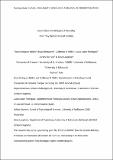Files in this item
Social class and ideologies of inequality : how they uphold unequal societies
Item metadata
| dc.contributor.author | Rodriguez-Bailon, Rosa | |
| dc.contributor.author | Bratanova, Boyka Antonova | |
| dc.contributor.author | Willis, Guillermo | |
| dc.contributor.author | Lopez-Rodriguez, Lucia | |
| dc.contributor.author | Sturrock, Ashley | |
| dc.contributor.author | Loughnan, Steve | |
| dc.date.accessioned | 2018-03-18T00:32:32Z | |
| dc.date.available | 2018-03-18T00:32:32Z | |
| dc.date.issued | 2017-03-17 | |
| dc.identifier | 240524503 | |
| dc.identifier | 26b88f0b-dcfb-4d6a-8a16-c989550a2774 | |
| dc.identifier | 85015358417 | |
| dc.identifier | 000397473400006 | |
| dc.identifier.citation | Rodriguez-Bailon , R , Bratanova , B A , Willis , G , Lopez-Rodriguez , L , Sturrock , A & Loughnan , S 2017 , ' Social class and ideologies of inequality : how they uphold unequal societies ' , Journal of Social Issues , vol. 73 , no. 1 , pp. 99-116 . https://doi.org/10.1111/josi.12206 | en |
| dc.identifier.issn | 0022-4537 | |
| dc.identifier.other | ORCID: /0000-0001-8247-0871/work/64361389 | |
| dc.identifier.uri | https://hdl.handle.net/10023/12970 | |
| dc.description | This research was partly supported by grant No. PSI2013-45678P, from the Spanish Ministry of Science and Innovation (Ministerio de Ciencia e Innovación) to the first author. | en |
| dc.description.abstract | Many societies are becoming increasingly unequal, especially after the Great Recession. This is occurring despite the evidence showing that economic inequality undermines personal and social wellbeing, and that inequality impairs the safe functioning of our societies. Although the main known causes of economic inequality are macro‐economic, some psychosocial factors can contribute to maintain it; these factors are the focus of this paper. Study 1 shows that feeling higher class and justifying the economic system increase the perception that the actual resource distribution is fair, and this in turn reduces the extent to which people see their society as unequal; effectively, social class and system justification blind people to inequality. Study 2 goes beyond blinded inequality to examine beliefs that oppose wealth redistribution. Both economic system justification (ESJ) and social dominance orientation (SDO) beliefs deepen inequality: People with strong ESJ or SDO tend not to endorse governmental and nongovernmental activities that reduce inequality. Further, these effects were mediated by a belief in dispositional poverty (i.e., internal causes for being poor). Combined, these studies highlight the importance of beliefs about social standing (subjective SES) and, especially, of ideology regarding the organization of society (ESJ, SDO) in maintaining and deepening levels of inequality. | |
| dc.format.extent | 199438 | |
| dc.language.iso | eng | |
| dc.relation.ispartof | Journal of Social Issues | en |
| dc.subject | HC Economic History and Conditions | en |
| dc.subject | NDAS | en |
| dc.subject | BDC | en |
| dc.subject | SDG 10 - Reduced Inequalities | en |
| dc.subject.lcc | HC | en |
| dc.title | Social class and ideologies of inequality : how they uphold unequal societies | en |
| dc.type | Journal article | en |
| dc.contributor.institution | University of St Andrews. Centre for Research into Equality, Diversity & Inclusion | en |
| dc.contributor.institution | University of St Andrews. School of Management | en |
| dc.identifier.doi | https://doi.org/10.1111/josi.12206 | |
| dc.description.status | Peer reviewed | en |
| dc.date.embargoedUntil | 2018-03-17 |
This item appears in the following Collection(s)
Items in the St Andrews Research Repository are protected by copyright, with all rights reserved, unless otherwise indicated.

